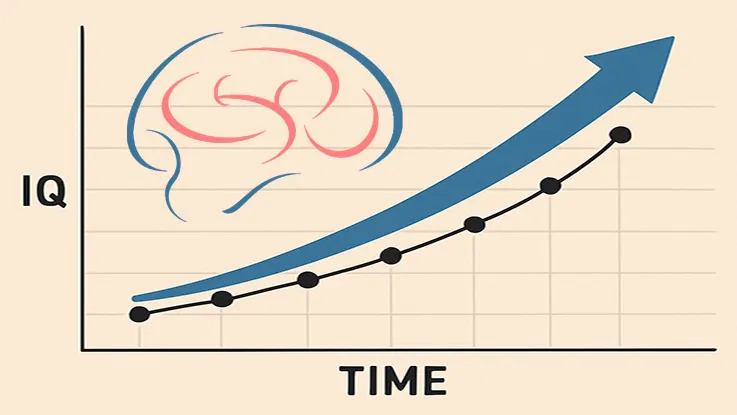
The Flynn Effect and IQ
We already discussed the Reverse Flynn Effect, but what exactly is the Flynn Effect?
For decades, Intelligence Quotient (IQ) has been considered a relatively stable measure of an individual’s cognitive ability. However, a surprising discovery in the 1980s shook these foundations: average IQ scores were constantly increasing across generations. This phenomenon, named the “Flynn Effect” after researcher James R. Flynn who uncovered it, sparked a fascinating debate on the nature of intelligence and how our society influences it.
Evidence of the Flynn Effect
The evidence for the Flynn Effect is undeniable. Studies conducted in numerous industrialized countries revealed an average increase of about 3 IQ points per decade. This means that an individual who scored average on an IQ test in the 1950s would today score significantly higher on the same test. This is not a small statistical fluctuation but a robust and persistent trend with profound implications for our understanding of intelligence.
What Drives the Rise?
What drives this relentless rise in IQ scores? The proposed explanations are numerous and reflect the complexity of intelligence itself. A key factor appears to be improvements in nutrition and general health. Newer generations benefit from better infant nutrition and broader access to healthcare, factors that can positively influence brain development and cognitive abilities.
Changing Environment
Another crucial element is the changing nature of our cognitive environment. The modern world is characterized by increasing complexity, constant exposure to new information, and a greater emphasis on abstract and hypothetical thinking. Education has become more widespread and sophisticated, stimulating skills such as categorization, formal logic, and manipulation of abstract concepts, all of which are measured by IQ tests.
Familiarity with Tests
Increasing familiarity with the tests themselves may also play a role. People today are more accustomed to answering questions in a standardized format and solving logical problems, thanks to exposure to school tests, video games, and other forms of interactive entertainment.
Understanding the Flynn Effect
It is important to note that the Flynn Effect does not necessarily imply that newer generations are intrinsically more intelligent than previous ones in every aspect. Rather, it suggests a shift in the cognitive abilities that are developed and valued by our society. IQ tests, while useful tools, focus on specific analytical and logical abilities, and the rise in scores could reflect a greater emphasis on these skills in our cultural and educational environment.
Intelligence’s Plasticity
The Flynn Effect represents a testimony to the plasticity of human intelligence and its deep interaction with the surrounding environment. Far from being a fixed and immutable trait, intelligence proves sensitive to social, cultural, and technological changes. Understanding the forces driving this continuous rise is essential for correctly interpreting IQ scores and for developing educational and social strategies that further promote cognitive development in all its facets. The constant increase in IQ scores, far from being a mere statistical data point, offers a fascinating glimpse into the evolution of our mental capabilities and the transformative power of our ever-changing world.
In Short
In short, the Flynn Effect shows that intelligence is not fixed but influenced by environmental, educational, and societal changes. The rise in IQ scores reflects the evolution of cognitive abilities in response to a more complex world. While not indicating superior intelligence in all aspects, it highlights the dynamic nature of human potential, shaped by the environment we live in.


